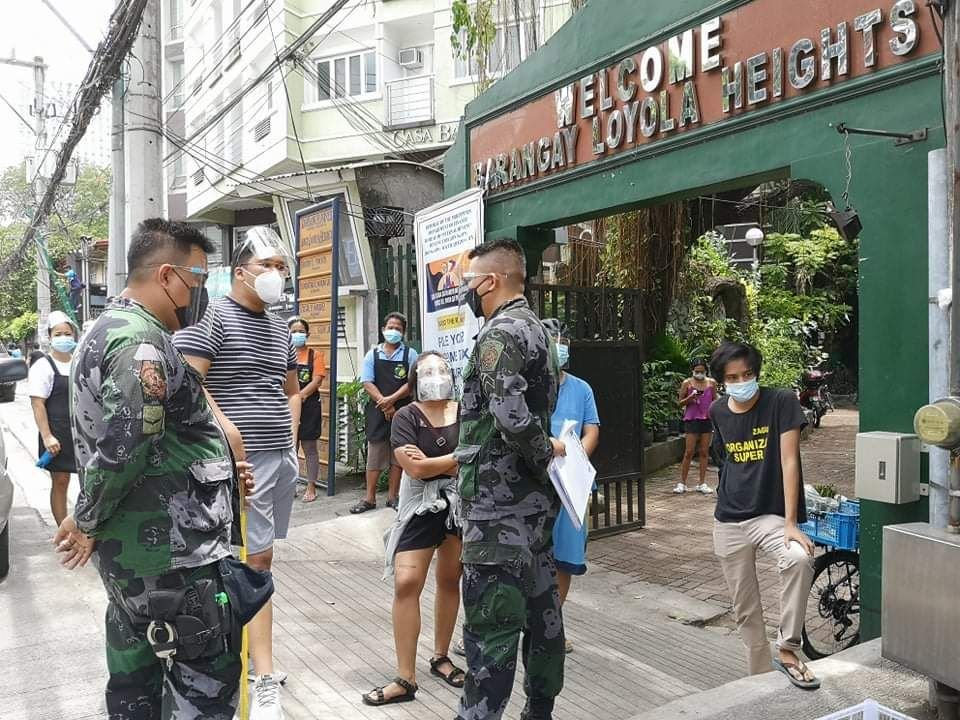TWO POLICE officers from the Quezon City Police District (QCPD) Anonas Police Station visited the community pantry at Barangay Loyola Heights Hall at around 10:30 AM on April 20. The organizers identified the police officers under the surnames “Boadilla” and “Dela Cruz.”
The community pantry intends to serve as an avenue for locals to pick up and donate basic necessities. These efforts have not only heightened community involvement amidst the COVID-19 pandemic, they have also been commonly perceived as a response to the lack of government support.
In an interview with The GUIDON, organizer of the Loyola Heights Community Pantry Ia Marañon (AB DS ‘18) said that police officers repeatedly asked who was responsible for the initiative. After reiterating that the pantry was organized by residents in the area, Marañon narrated that police officers mumbled about social distancing. Seeming unsatisfied with Marañon’s response, the officers directed their questions to Loyola Heights Barangay Secretary Gemma Mendoza instead.
The police encounter came following the temporary suspension of the Maginhawa Community Pantry on April 20, when organizers were red-tagged by government units including the QCPD and the National Task Force to End Local Communist Armed Conflict.
In response to these allegations, Maginhawa Community Pantry organizer Ana Patricia Non asserted that the effort has no political affiliation whatsoever. This comes after a reporter asked Non whether she had links to communist groups during a press conference. The initiative resumed operations last April 21.
Assisting the initiative
The Loyola Heights community pantry was initially set up by Marañon last April 17, taking inspiration from the viral Maginhawa Community Pantry. Later on, the community pantry was expanded to the RCArceo Enterprise Rice Center with the aid of Loyola Schools Theology part-time lecturer Johanne Arceo. The move was supported by the Varsity Hills Neighborhood Association.
Although the community pantry is an informal initiative, Marañon noted that only two to three people are allowed to access the pantry at a time. Barangay tanods or patrols roam around the community pantry to maintain social distancing and health protocols among the people lining up.
However, Mendoza noted that compliance to public health procedures cannot be guaranteed since barangay patrols are not consistently present in community pantries. “Hindi 24/7, or around the clock nag-papatrol […] kaya ‘di maiiwasan na may mag-break ng [health] protocols (Patrolling is not done 24/7 or around the clock, hence, breaking protocols would not be avoided),” she said.
Mendoza also explained that different citizens would ultimately contribute to the community pantry due to the informal and spontaneous nature of the initiative. “Hindi naman nililista ng barangay ang mga organizers at donors (The barangay does not list down the initiative’s organizers and donors),” she noted.
Mendoza stated that an undisclosed organizer already informed barangay officials regarding the community pantry. In addition, she clarified that the barangay hall does not require the issuance of a permit from the organizers before setting up a community pantry.
In contrast, Department of Interior and Local Government (DILG) Undersecretary Martin Diño said in an interview that organizers must secure a permit from their local government units (LGU). DILG Secretary Eduardo Año later recanted the statement, saying that organizers would only need to coordinate with their LGUs should they wish to set up their own community pantry.
Protecting organizers
In light of the recent incidents, Quezon City Mayor Joy Belmonte released a statement supporting the community pantry organizers. She additionally disclosed that Quezon City Police District (QCPD) District Director Brigadier General Antonio Yarra has already been contacted to conduct investigations on Non’s concerns regarding the police’s red-tagging.
Aside from this, the Quezon City People’s Law Enforcement Board (QC PLEB) also expressed to media reporters that they will be investigating the QCPD’s red-tagging of community pantries. The board questioned why police officers were asking organizers for their cellphone numbers and affiliations.
In a letter sent to the QCPD last April 20, the QC PLEB asked for a formal explanation regarding the incident. The QCPD has not responded to the request as of writing.
In response to the red-tagging of community pantries nationwide, however, Philippine National Police (PNP) Chief Debold Sinas said that it is beyond the PNP’s interest to delve into the activities of private citizens. He added that the police did not interfere and only extended assistance in the community pantries’ activities.
Akbayan! Youth Loyola also stood in solidarity with the Loyola Heights organizers and called for a halt of police presence in community pantries across the country. “Their persistent meddling in community affairs is not welcome and their energy would be better off doing their job and addressing the inaction of the government,” the group said in a statement.
Similarly, Marañon shared that she feels unsafe with the police’s presence around the Loyola Heights community pantry. “The police, especially now after the drug war and the attacks on activists, have no place in our communities. It’s very telling that we have to set security protocols for the police,” she added.
Despite the police visit, Arceo and Marañon asserted that the community pantry will remain open following a surge in donations after the incident.
“The recent incident only inspired people to be more generous and courageous in their resistance to the intimidation. More than anything, it was further proof that goodness in action will always prevail,” Arceo said.







